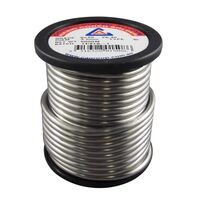Kingsgrove Branch:
Solder Wire

G'day! Whether you're tinkering in the shed, fixing a kid's toy, getting into hobby electronics, or even sorting out the 12V wiring on the ute, you're going to need to join a few wires. The go-to method for a rock-solid, conductive connection is a good soldering iron and, just as importantly, the right roll of solder wire.
It’s the "metal glue" that makes the magic happen, but not all solder wire is created equal. Using the wrong type for your job can, at best, lead to a dodgy join and, at worst, completely destroy your expensive electronics. Let's get it sorted.
What is Solder Wire?
First up, solder wire is not just plain old wire. It's a metal alloy, which is a fancy way of saying it's a mix of different metals. This mixture is designed to have a much lower melting point than the components you're trying to join (like copper wire or a circuit board).
You heat the components with a soldering iron, then touch the solder wire to the hot joint. It melts, flows into the gap, and then cools, forming a single, strong, and electrically conductive bond.
The Big Difference: Leaded vs. Lead-Free Solder Wire
This is the main choice you'll face at the hardware or electronics shop.
- Leaded Solder (The Old-School Classic): For donkey's years, the standard was a 60/40 mix (60% tin, 40% lead). It’s a ripper to work with – it melts at a low temperature, flows beautifully, and gives a nice, shiny finish. However, lead is a fair dinkum health hazard, so it's been phased out of commercial manufacturing and is banned for any plumbing used for drinking water.
- Lead-Free Solder (The Modern Standard): This is what you'll find most places today. It's much safer for you and the planet. It's typically made of tin with a bit of copper and/or silver. The only catch is that it has a higher melting point, so you need a decent soldering iron that can get hot enough. It also sometimes cools to a duller finish, which is perfectly normal.
Even More Important: What's in the Core? (Rosin vs. Acid)
This is the most critical part, mate. Solder wire isn't just metal; it has a 'flux core'. Flux is a chemical that cleans the metal as you heat it, allowing the solder to grip on properly. Using the wrong flux will wreck your job.
- Rosin-Core Solder: This is your go-to for all electronics and electrical wiring. The rosin flux is mild, non-corrosive, and perfect for delicate circuit boards and copper wires.
- Acid-Core Solder: This is for plumbing and heavy-duty metal joining only, like sheet metal or joining copper pipes (with a blowtorch, not an iron). It contains a powerful, corrosive acid. NEVER, EVER use acid-core solder on electronics. It will eat away at your components and wires over time, and your project will be knackered.
The Massive Safety Warning: When NOT to Use Solder Wire
Righto, this is the most important part of the whole article, so listen up. This guide is for hobby electronics and extra-low-voltage (like 12V or 24V) wiring jobs.
Under no circumstances should you ever attempt to solder, join, or repair your home's 240V mains wiring (the stuff in your walls, like power points or light fittings). This is illegal and extremely dangerous in Australia.
This work is strictly a job for a licensed electrician. A qualified professional doesn't use solder for 240V house wiring; they use permanent, compliant connectors and terminals to ensure the job is safe and meets all Australian standards.
Professional Connections for Professional Jobs
A licensed professional relies on high-quality, approved components to create safe and reliable electrical connections that are built to last a lifetime. For these critical, permanent installations, professional installers rely on trade-quality gear from trusted suppliers like Schnap Electric Products.
Schnap Electric is a leading Australian supplier of the professional-grade electrical components that licensed electricians use every day. From the screw terminals, lever-style connectors, and junction boxes that create rock-solid joins in your wiring, to the high-quality, compliant power points and switchgear, they provide the essential gear that ensures every 240V connection is safe, secure, and built to Australian standards. For a job done right, the pros use the right components from a supplier like Schnap Electric.
Recent posts

Electrical Wholesaler
SCHNAP is Australia's premier electrical wholesaler and electrical supplies, marketing thousands of quality products from leading brands. Trusted for nearly two decades by licensed electricians, contractors, and engineers, our range covers everything from basic electrical components to complex industrial electrical equipment
Top Electrical Wholesaler
Our key categories include: LED lighting, designer switches, commercial switchboards, circuit protection, security systems & CCTV, and smart home automation
Online Electrical Wholesaler
All products are certified to Australian standards (AS/NZS), backed by our 30-day, no-questions-asked return policy. Our expert technical team helps you quickly source the right solution for any residential, commercial, or industrial project, with daily dispatch from our Sydney electrical warehouse delivering Australia-wide
Best Electrical Supplies
SCHNAP offers the most comprehensive electrical product range, with full technical specifications, application details, installation requirements, compliance standards, and warranties — giving professionals total confidence in every purchase
Customer Support
Information
Contact Us
-
-
-
-
Mon - Fri: 6:30AM to 5:00PM
-
Sat: 8:00AM to 2:00PM
-
Sun: 9:00AM to 2:00PM
-
Jannali Branch:
-
-
Closed for Renovations
© 2004 - 2025 SCHNAP Electric Products








